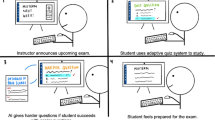Abstract
In an earlier issue of ETR&D, the editors provided an hierarchical framework of components to support learning and instruction. That hierarchy included information objects, knowledge objects, learning objects, instructional objects, courses, programs and ongoing efforts, with each subsequent component building on the former components. For example, a course is a structured collected of instructional objects, which in turn are structured collections of learning objects with learning activities, feedback, and assessments (both formative and summative). Based on that hierarchical perspective, most of the current massive open online courses (MOOCs) are not actually courses. This article proposes taking what is good about the MOOC concept and transforming it into something that could be considered a course—namely, a mini-MOOC.


Similar content being viewed by others
References
Baker, E. (2007). 2007 Presidential address: The end(s) of testing. Educational Researcher, 36(6), 309–317. Retrieved from http://edr.sagepub.com/content/36/6/309.abstract.
Dewey, J. (1938). Experience and education. New York: Kappa Delta Pi.
Downes, S. (2008). CCK08—The distributed course. The MOOC guide. Retrieved from https://sites.google.com/site/themoocguide/3-cck08---the-distributed-course.
Hofsdadter, D. R. (1979). Gödel, Escher, Bach: An eternal golden braid. New York: Basic Books.
Larson, M., & Lockee, B. B. (2014). Streamlined ID: A practical guide to instructional design. New York: Routledge.
Merrill, M. D. (2013). First principles of instruction: Identifying and designing effective, efficient and engaging instruction. San Francisco: Wiley.
Spector, J. M. (2012). Foundations of educational technology: Integrative approaches and interdisciplinary perspectives. New York: Routledge.
Spector, J. M. (2014). Emerging educational technologies: Tensions and synergy. Journal of King Saud University—Computer and Information Sciences, 26(1), 5–10.
Spector, J. M., Johnson, T. E., & Young, P. A. (2014). An editorial on research and development in and with educational technology. Educational Technology Research and Development, 62(1), 1–12.
Spector, J. M., Merrill, M. D., Elen, J., & Bishop, M. J. (Eds.). (2013). Handbook of research on educational communications and technology. New York: Springer.
Woolf, B. P. (Ed.). (2010). A roadmap for education technology [National Science Foundation Grant #0637190]. Washington, DC: National Science Foundation.
Martindale, T. (2014). Massive open online courses. In J. M. Spector (Ed.), Encyclopedia of educational technology. Thousand Oaks: Sage Publications.
Author information
Authors and Affiliations
Corresponding author
Rights and permissions
About this article
Cite this article
Spector, J.M. Remarks on MOOCS and Mini-MOOCS. Education Tech Research Dev 62, 385–392 (2014). https://doi.org/10.1007/s11423-014-9339-4
Published:
Issue Date:
DOI: https://doi.org/10.1007/s11423-014-9339-4



